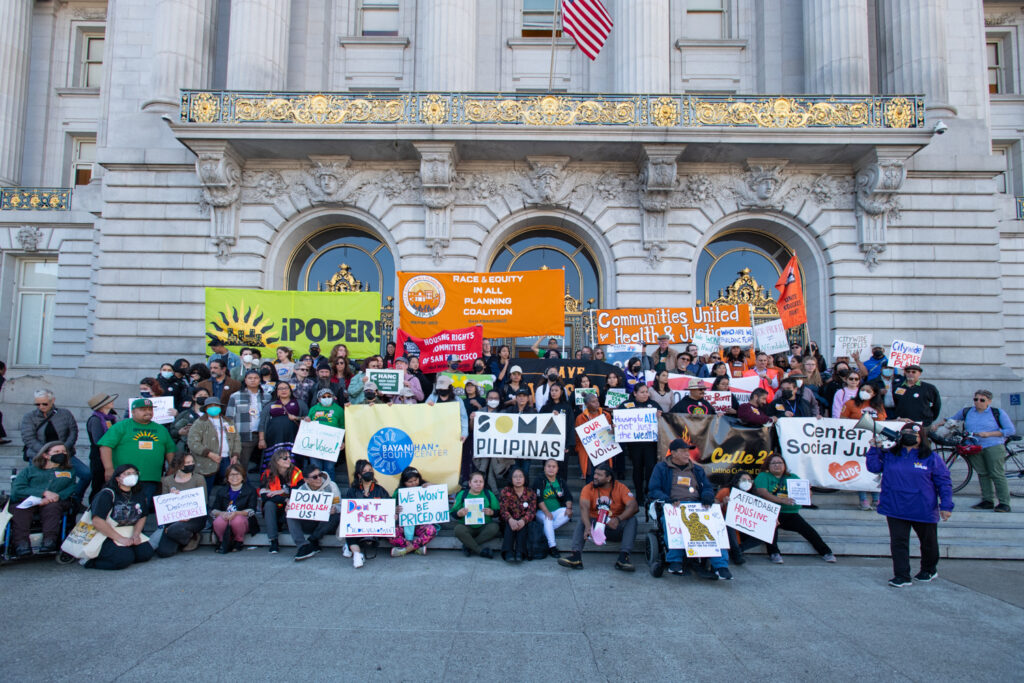A broad coalition of community groups is calling on the Board of Supes to take a dramatic step and amend the Planning Department’s Housing Element with the elements of a grassroots plan that puts affordable housing first.
The Race and Equity in All Planning Coalition has put forward a very different approach than what planning officials are offering.

The coalition came to the Board of Supes Tuesday for a hearing on the Housing Element, and board members from the left and the right of the spectrum said that the plan is, by itself, unlikely to make any new housing happen, particularly affordable housing.
Planning Director Rich Hillis made clear that the state, driven by policies from our own representatives in the Legislature, has no particular interest in affordable housing and cares mostly about “reducing constraints” on private market-rate housing developers.
Hillis acknowledged that there’s no strategy anywhere in the Planning Department or the Mayor’s Office to fund the level of affordable housing that the plans calls for, and the state (in theory) is mandating.
In essence, he said, the Housing Element, which contains some wonderful and important equity language, exists primarily to satisfy Gov. Gavin Newsom’s Department of Housing and Community Development that San Francisco is going to be welcoming to profit-driven developers.
From the community plan:
Drafts of the Housing Element were instead grounded in a profit-driven, market-based strategy for building condos across San Francisco. Then Planning invited communities to provide comments on their market-based plan through questions and working groups that Planning directed. Planning’s approach was unfortunately antithetical to equitable outcomes because it started with a profit-driven, market-based premise, entirely framed by the ideologies of Planning staff rather than starting from community plans and letting low-income and Communities of Color lead this process and frame the discussions.
Planning primarily used profit and market-based premises as their starting point. But market-rate housing is funded by profit-motivated capital which is only interested in investing in markets with increasing rather than decreasing prices. Increasing housing inventory will never result in a drop in prices– new market-rate units will not be built in a declining market
The principle underlying this entire Housing Element is that building more profit-driven, market rate housing supply is an essential strategy for meeting the Housing Element’s racial and social equity goals. Not only are market-rate housing developers’ business plans developed around profitability instead of racial and social equity and economic inclusion, but there is increasingly an international market that has developed to distract the housing “market” from providing housing for people, but rather, as housing and gentrification experts recently laid out, tends toward greater commodification and financialization.
All of this leads to what Sup. Dean Preston called “complete garbage.”
Help us save local journalism!
Every tax-deductible donation helps us grow to cover the issues that mean the most to our community. Become a 48 Hills Hero and support the only daily progressive news source in the Bay Area.
The current plan offers zero funding sources for a level of affordable housing that will require at least $19 billion over the next eight years. And the state has offered not help.
Preston noted that over the last RHNA cycle, the city approved and saw built 150 percent of the market-rate housing that the state mandated—and only 50 percent of the affordable housing.
He asked Hillis what would happen if the same scenario played out.
The Governor’s Office, Hillis said, “is not focused on that.” State officials only care about rezoning to allow easier private development.
“The state Legislature and the real-estate industry the pays for their elections doesn’t give a damn about affordable housing,” Preston said.
Sup. Catherine Stefani, the most conservative member of the board, said that she has seen entitled more than 1,000 new units in District 2, but none have been built. She complained about excessive fees, but she also said that “you can’t force people to build” if there isn’t enough profit.
That, of course, is the problem with a plan that is based on the hope that the private market will solve our problems.
Sup. Hillary Ronen said that the issue isn’t “streamlining” or red tape. “Every member of this Board of Supervisors would streamline 100 percent affordable housing,” she said. “Built it everywhere, build it dense, build it tall. We don’t have close to the money to do it.”
The state, said, “doesn’t care at all if we build a single unit” of affordable housing. “Shame on the state.”
Preston suggested that the city come up with a housing plan that includes the money for more than 40,000 units of affordable housing, and then asks the state to fund it.
But “until that day,” he said, “we need to stop thinking that the state and the feds are going to come in.” The local options, he said, include dramatically increasing the city’s bonding capacity to raise $1 billion a year for affordable housing.
“That’s something we can do,” he said.




